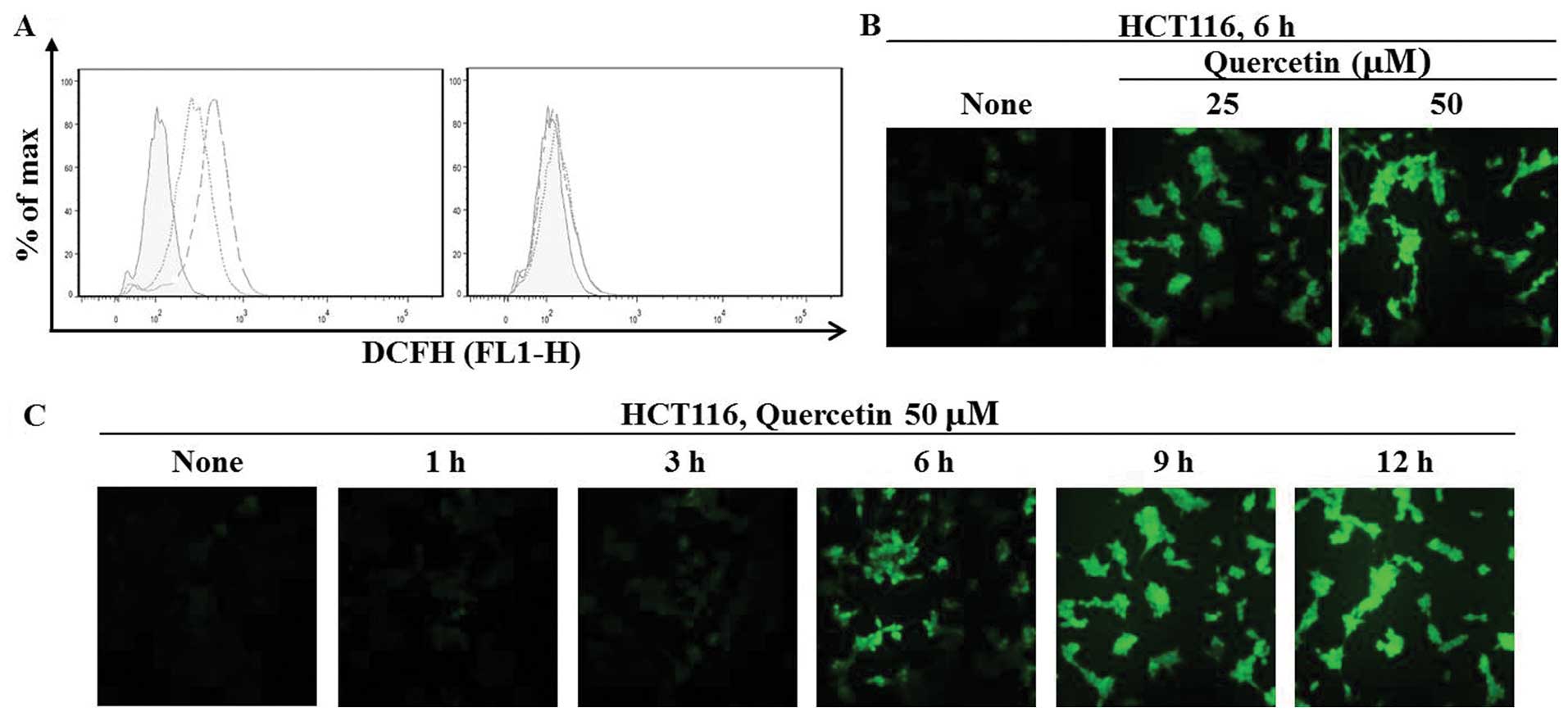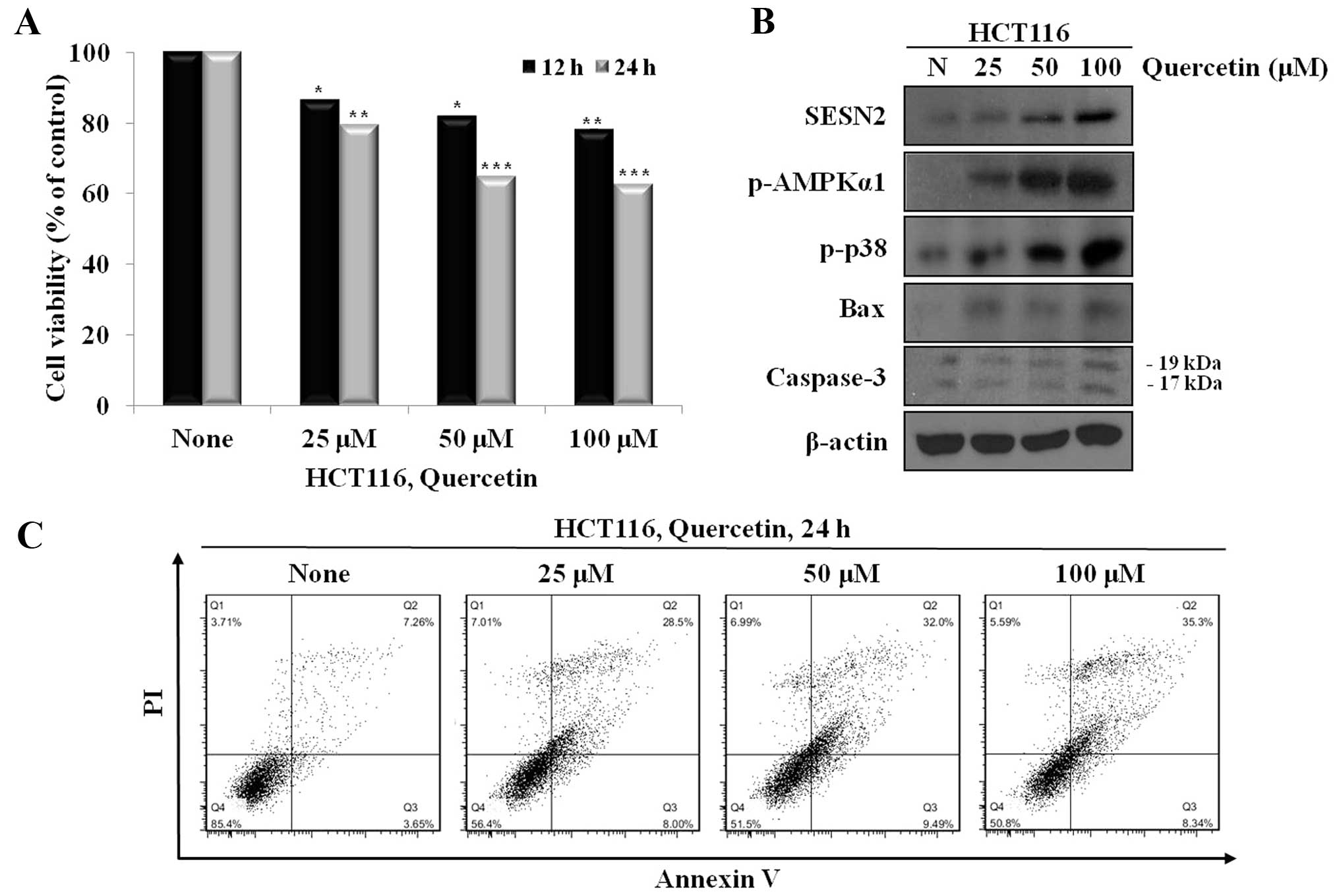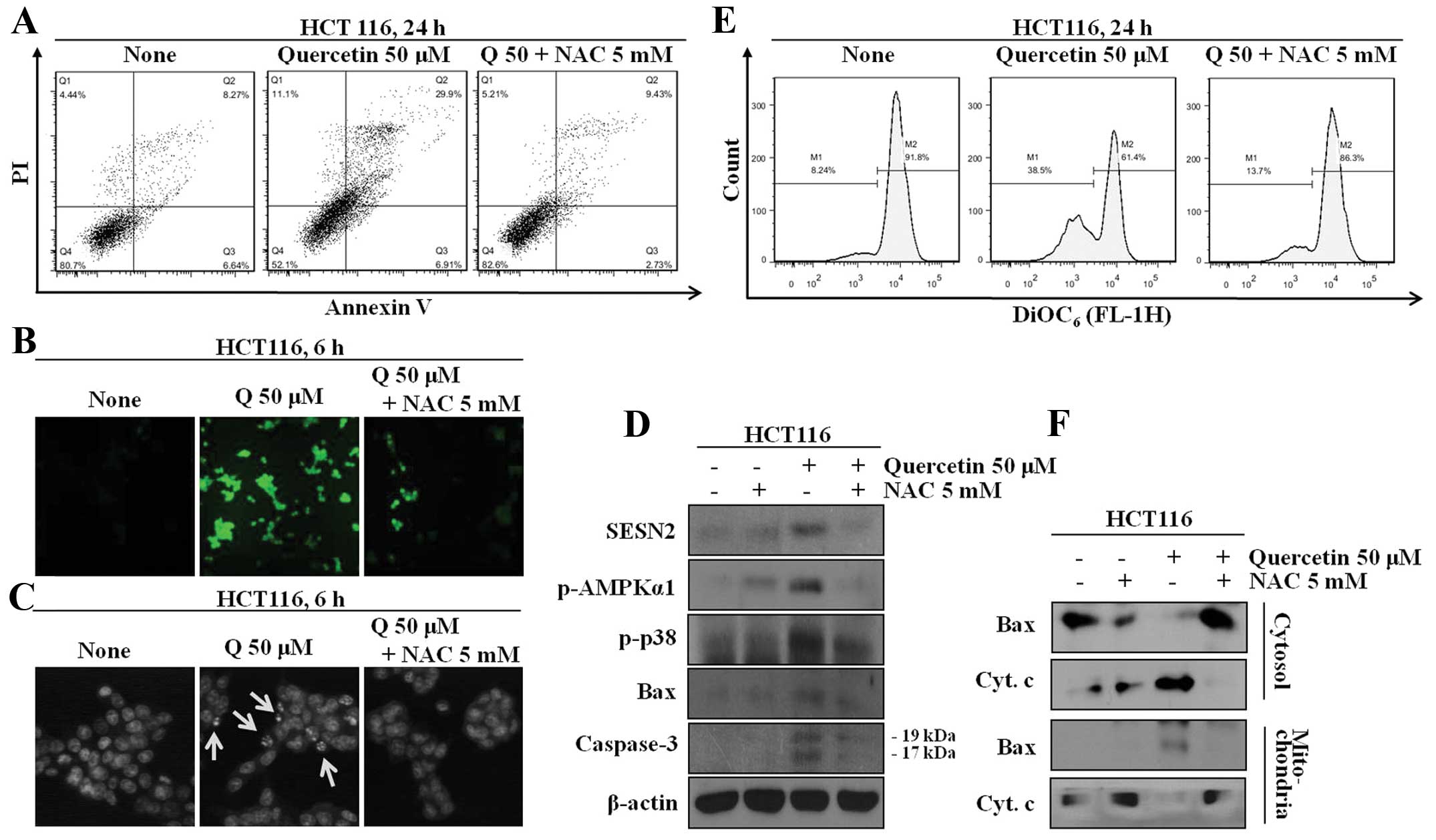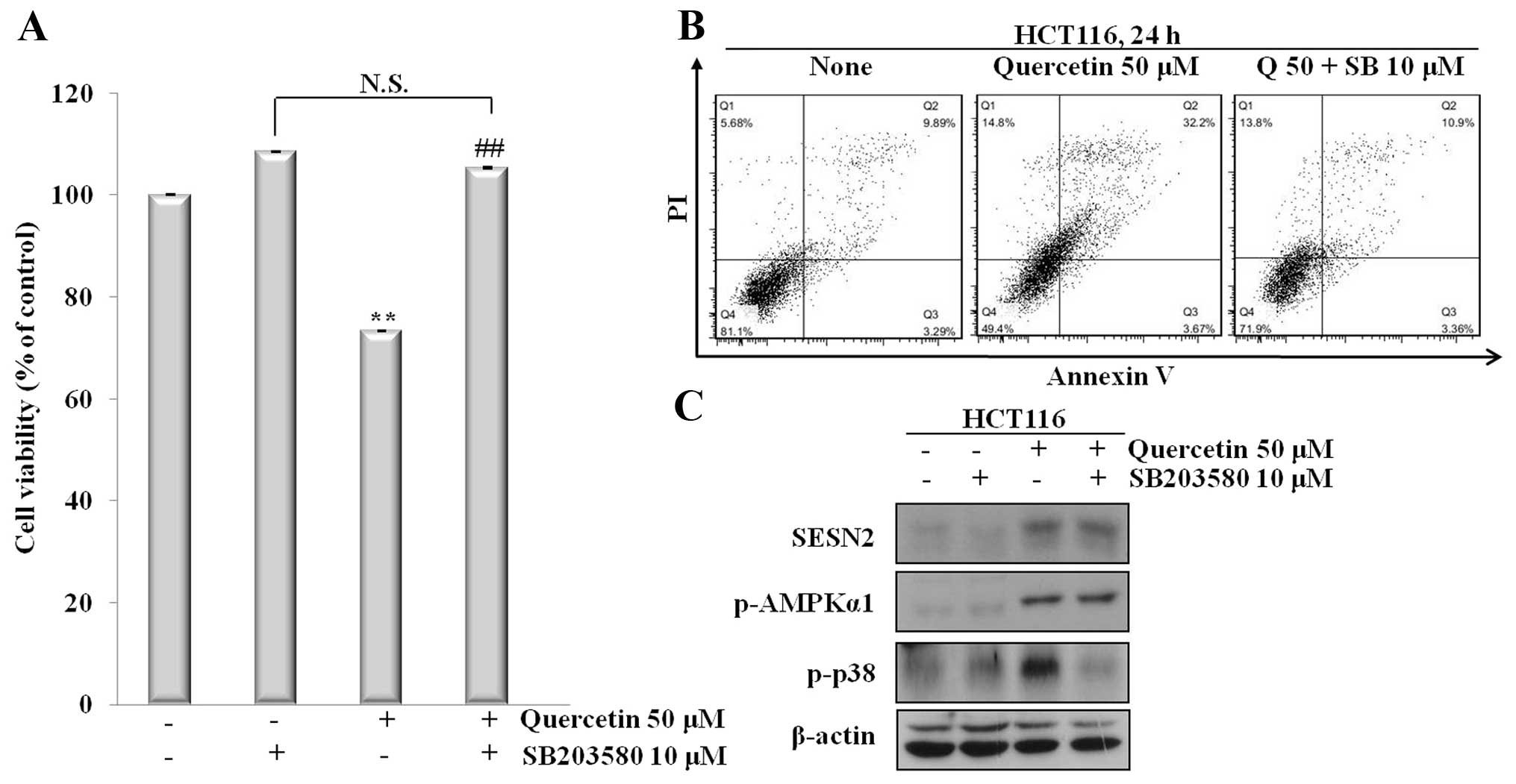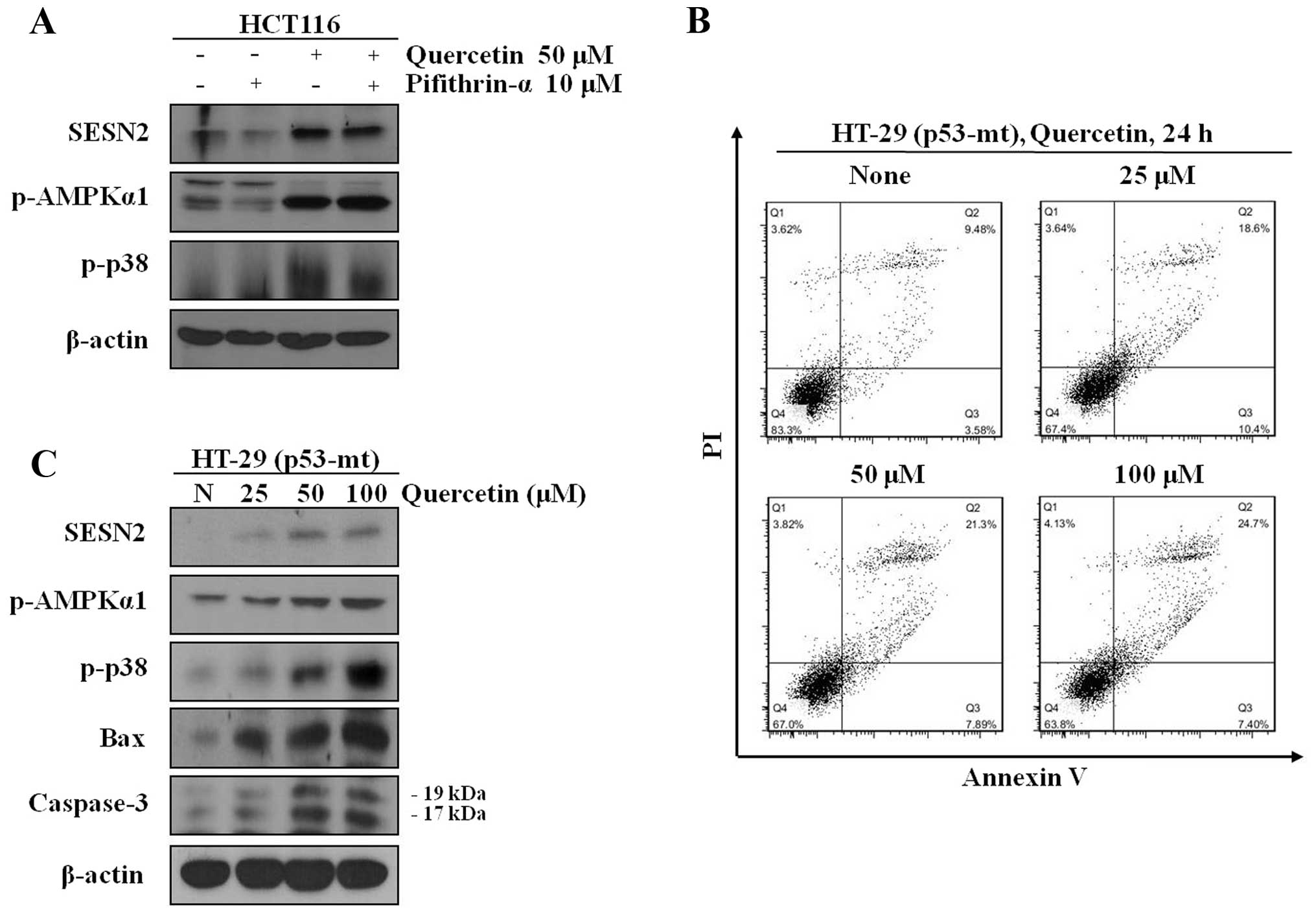|
1
|
Jemal A, Bray F, Center MM, et al: Global
cancer statistics. CA Cancer J Clin. 61:69–90. 2011. View Article : Google Scholar
|
|
2
|
Center MM, Jemal A and Ward E:
International trends in colorectal cancer incidence rates. Cancer
Epidemiol Biomarkers Prev. 18:1688–1694. 2009. View Article : Google Scholar : PubMed/NCBI
|
|
3
|
Giovannucci E: Modifiable risk factors for
colon cancer. Gastroenterol Clin North Am. 31:925–943. 2002.
View Article : Google Scholar : PubMed/NCBI
|
|
4
|
Gibellini L, Pinti M, Nasi M, et al:
Quercetin and cancer chemoprevention. Evid Based Complement
Alternat Med. 2011:5913562011.PubMed/NCBI
|
|
5
|
Chien SY, Wu YC, Chung JG, et al:
Quercetin-induced apoptosis acts through mitochondrial- and
capase-2-dependent pathways in human breast cancer MDA-MB-231
cells. Hum Exp Toxicol. 28:493–503. 2009. View Article : Google Scholar : PubMed/NCBI
|
|
6
|
Lee YK, Park SY, Kim YM, et al: AMP
kinase/cyclooxygenase-2 pathway regulates proliferation and
apoptosis of cancer cells treated with quercetin. Exp Mol Med.
41:201–207. 2009. View Article : Google Scholar : PubMed/NCBI
|
|
7
|
Tanigawa S, Fujii M and Hou DX:
Stabilization of p53 is involved in quercetin-induced cell cycle
arrest and apoptosis in HepG2 cells. Biosci Biotechnol Biochem.
72:797–804. 2008. View Article : Google Scholar : PubMed/NCBI
|
|
8
|
Budanov AV and Karin M: p53 target genes
Sestrin1 and Sestrin2 connect genotoxic stress and mTor signaling.
Cell. 134:451–460. 2008. View Article : Google Scholar : PubMed/NCBI
|
|
9
|
Sanli T, Linher-Melville K, Tsakiridis T,
et al: Sestrin2 modulates AMPK subunit expression and its response
to ionizing radiation in breast cancer cells. Plos One.
7:e320352012. View Article : Google Scholar : PubMed/NCBI
|
|
10
|
Budanov AV, Lee JH and Karin M: Stressin’
Sestrins take an aging fight. EMBO Mol Med. 2:388–400. 2010.
|
|
11
|
Budanov AV, Shoshani T, Faerman A, et al:
Identification of a novel stress-responsive gene Hi95 involved in
regulation of cell viability. Oncogene. 21:6017–6031. 2002.
View Article : Google Scholar : PubMed/NCBI
|
|
12
|
Shin BY, Jin SH, Cho IJ, et al: Nrf2-ARE
pathway regulates induction of Sestrin-2 expression. Free Radic
Biol Med. 53:834–841. 2012. View Article : Google Scholar : PubMed/NCBI
|
|
13
|
Sablina AA, Budanov AV, Ilyinskaya GV, et
al: The antioxidant function of the p53 tumor suppressor. Nat Med.
11:1306–1313. 2005. View
Article : Google Scholar : PubMed/NCBI
|
|
14
|
Abbott MJ, Edelman AM and Turcotte LP:
CaMKK is an upstream signal of AMP-activated protein kinase in
regulation of substrate metabolism in contracting skeletal muscle.
Am J Physiol Regul Integr Comp Physiol. 297:1724–1732. 2009.
View Article : Google Scholar : PubMed/NCBI
|
|
15
|
Alexander A and Walker CL: The role of
LKB1 and AMPK in cellular responses to stress and damage. FEBS
Lett. 585:952–957. 2011. View Article : Google Scholar : PubMed/NCBI
|
|
16
|
Shaw RJ, Kosmatka M, Bardeesy N, et al:
The tumor suppressor LKB1 kinase directly activates AMP-activated
kinase and regulates apoptosis in response to energy stress. Proc
Natl Acad Sci USA. 9:3329–3335. 2004. View Article : Google Scholar : PubMed/NCBI
|
|
17
|
Lee YK, Hwang JT, Kwon DY, et al:
Induction of apoptosis by quercetin is mediated through
AMPKα1/ASK1/p38 pathway. Cancer Lett. 292:228–236. 2010.
|
|
18
|
Cao C, Lu S, Kivlin R, et al:
AMP-activated protein kinase contribute to UV− and H2O2− induced
apoptosis inhuman keratinocytes. J Biol Chem. 283:28897–28908.
2008.
|
|
19
|
Capano M and Crompton M: Bax translocates
to mitochondria of heart cells during simulated ischaemia:
involvement of AMP-activated and p38 mitogen-activated protein
kinases. Biochem J. 395:57–64. 2006. View Article : Google Scholar : PubMed/NCBI
|
|
20
|
Park S, Scheffler TL, Rossie SS, et al:
AMPK activity is regulated by calcium-mediated protein phosphatase
2A activity. Cell Calcium. 53:217–223. 2013. View Article : Google Scholar : PubMed/NCBI
|
|
21
|
Jones RG, Plas DR, Kubek S, et al:
AMP-activated protein kinase induces a p53-dependent metabolic
checkpoint. Mol Cell. 29:283–293. 2005. View Article : Google Scholar : PubMed/NCBI
|
|
22
|
Mouria M, Gukovskaya AS, Jung Y, et al:
Food-derived polyphenols inhibit pancreatic cancer growth through
mitochondrial Cytochrome c release and apoptosis. Int J Cancer.
98:761–769. 2002. View Article : Google Scholar : PubMed/NCBI
|
|
23
|
Feng Z, Zhang H, Levine AJ, et al: The
coordinate regulation of the p53 and mTOR pathways in cells. Proc
Natl Acad Sci USA. 102:8204–8209. 2005. View Article : Google Scholar : PubMed/NCBI
|
|
24
|
Lee SO, Andey T, Jin UH, et al: The
nuclear receptor TR3 regulates mTORC1 signaling in lung cancer
cells expressing wild-type p53. Oncogene. 31:3265–3276. 2012.
View Article : Google Scholar : PubMed/NCBI
|
|
25
|
Olivier M, Hollstein M and Hainaut P: TP53
mutation in human cancers: origins, consequences, and clinical use.
Cold Spring Harb Perspect Biol. 2:a0010082010. View Article : Google Scholar : PubMed/NCBI
|















